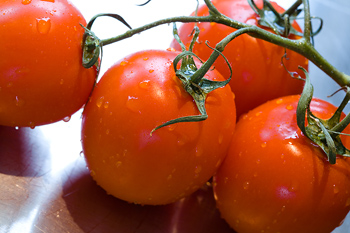Wash Produce Just Before Eating

First, store produce in the refrigerator (except for potatoes, tomatoes and bananas, which don’t need refrigeration) just as they come from the store until you are ready to eat them.
At that point, thoroughly rinse fresh fruits and vegetables under running water. Cut away any bruised or damaged areas before eating, and use a clean vegetable brush to scrub produce with firm skin, such as melons and cucumbers.
Be sure to prepare only the amount of fresh produce you plan to eat right away. Don’t store wet fruits and vegetables — wash just before preparation. If necessary, dry produce thoroughly before placing it back in the refrigerator.
The reason for these precautions? It’s simple. Bacteria need three things to multiply: nutrients, moisture and time. Bacteria tend to grow on bruised and cut edges of fruits and vegetables — those sites are rich sources of nutrients. Don’t add more such sites by cutting into the produce long before eating it. When you wash produce, you’re adding moisture. If you then store the produce, even in the refrigerator, that allows bacteria time to multiply, possibly to a point where it could cause illness.
Although cold temperatures retard most bacterial growth, some organisms can multiply even in the refrigerator, especially if the temperature is above 40 degrees F. You can reduce the risk of all these factors by not preparing or washing produce until just before eating it. Also, check the temperature of your refrigerator with a thermometer to be sure it is cold enough.
This advice is particularly important for children, the elderly, and persons with weakened immune systems, all of whom are at high risk of developing serious illness from foodborne disease.
Of course, also follow standard food safety guidelines, including:
- Wash your hands often, especially after using the bathroom or changing diapers, before and after eating or preparing food, and after touching animals.
- Cook ground beef to 160 degrees F. Use a thermometer to test it.
- Keep raw meat away from other foods. Wash your hands, cutting board, counter, dishes and silverware with hot soapy water after they touch raw meat or produce.
- Drink only milk, juice or cider that’s been pasteurized.
- Avoid eating raw sprouts. The conditions under which seeds are sprouted also are ideal growth conditions for microbes, which means a few bacteria that could be present on seeds can grow to high numbers on sprouts.
This article originally appeared in Chow Line (06/27/08), a service of Ohio State University Extension and the Ohio Agricultural Research and Development Center and was adapted for use on NetWellness with permission, 2008.
For more information:
Go to the Diet and Nutrition health topic.